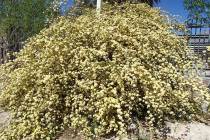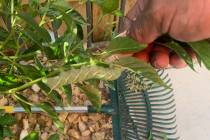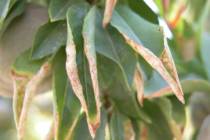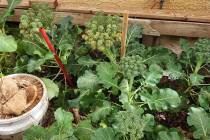Keeping aphids out of garden impossible
When it comes to garden pests, even my daughters learned about aphids in kindergarten. I guess it’s a natural considering it’s the favorite meal of lady beetles — every child’s favorite insect.
Aphids are one of the most universal pests of summer gardens everywhere. There are approximately 4,000 species of these mostly small (1/8-inch) soft-bodied creatures worldwide, yet only about 250 are considered to be potentially damaging and rarely fatal to plants.
Although not always the case, most aphids have their own preferred species of plant. So, just because you find them overtaking your beans for example, don’t assume they’ll spread to your zinnias. And even when their numbers seem to be out of control, the damage they inflict is not as bad as it might appear.
Aphids use a part of their mouth called a stylet, much like a mosquito would, to pierce and suck plant fluids from the stems and leaves. New plants are more susceptible to damage than mature plants and most of the time, the visible signs of heavy feeding are yellowed plants and or wilted leaves.
The greatest threat to a plant’s health is not the loss of plant fluids, it’s the risk of aphids transmitting a virus from one plant to another. There is no treatment for this, so the only control is to remove and destroy infected plants. Unfortunately, by the time an aphid population is discovered, any potential threat of infection has likely already occurred.
So what can you do to protect your plants?
You can’t prevent aphids’ arrival to your garden, but being proactive by inspecting your plants on a regular basis is the best defense. But you have to look closely. Aphids tend to feed on the lower portion of the plant or on the stems and undersides of leaves.
One indication of an aphid invasion may be the presence of lots of ants or a black sooty mold on the leaves. The ants feed on the honey dew, the sugary excretion left behind by aphids after they feed. Ants love this, and will defend aphids from predators in order to protect their prized food source.
Then what do you do to control a population explosion of these tiny insects?
The first line of defense should be a stiff spray of water, this is very effective. They are easily blasted off plants, and become a tasty meal for other beneficial insects or birds that might be nearby.
You also can create an environment that encourages the presence of beneficial insects by avoiding unnecessary pesticides. Lady beetles, parasitic wasps and hoverfly larvae are all effective natural controls.
They’ll find their way to your garden when aphid populations rise, and will stick around to manage the population naturally. However, spraying nonselective insecticides can wipe out your beneficial insect population, exposing your garden to a repopulation of aphids and other pests.
However, if you feel the need to resort to sprays, use the least toxic methods first. A good choice is insecticidal soap. It’s effective against soft-bodied insects like aphids, but has less risk of affecting harder shelled insects. Insecticidal soap is readily available to buy, or you can make your own by mixing a teaspoon of vegetable oil and liquid dish soap (not detergent) to a quart of water. As a contact insecticide, it must be sprayed directly onto the aphids to be effective.
These fairly benign sprays are still considered nonselective and can kill some beneficial insects, so use them sparingly. Also, some plants are more sensitive than others so apply either in the cool of the evening or early in the morning to minimize the risk of possible damage to plants.
Paying attention by inspecting your plants on a regular basis is a good first line of defense at controlling any pest and even a better reason to spend more time in your garden as well.
Joe Lamp’l is the host of “Fresh from the Garden” on the DIY Network and “GardenSMART” on PBS. Contact him at www.joegardener.com.


















